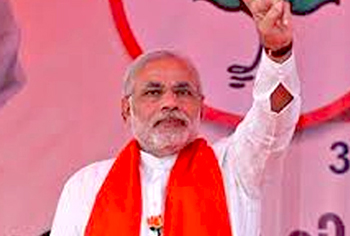New Delhi, May 25: Prime Minister Narendra Modi reached Mathura and is expected to announce the implementation of the “one rank one pension” (OROP) scheme for retired personnel of the armed forces at his rally in Mathura on Monday to mark one year of his government.
Modalities related to the long-pending demand of former servicemen have been thrashed out, defence ministry sources were quoted as saying by media.
 Modi could make an announcement about the scheme at the rally in Mathura, the sources said.
Modi could make an announcement about the scheme at the rally in Mathura, the sources said.
Finance minister Arun Jaitley said on Friday that the one rank one pension concept will be implemented as it is "an unambiguous commitment" of the NDA government.
The defence ministry is talking to stakeholders on methodology to calculate the pension, he said.
The scheme relates to the payment of a uniform pension to armed forces personnel who retire in the same rank with the same length of service, irrespective of their date of retirement.
The government told the Parliament earlier this year that the principle of one rank one pension for the armed forces had been accepted and would be implemented once modalities were approved by the government.
The main opposition Congress has demanded that the Centre should set a date for rolling out the one rank one pension scheme.
Noting that the previous UPA regime had announced the scheme in February last year, the Congress described the delay of 14 months by the NDA as "criminal inaction".
Congress vice president Rahul Gandhi assured a delegation of retired defence personnel on Saturday that his party would pressure the government for implementing one rank one pension.
“One year has passed of the NDA government and it has not proceeded with the issue. They (retired servicemen) had knocked the doors of the government but nothing materialised. The army, navy and air force take care of the nation and secure our borders, their demands should be met," he said.






Comments
Flat horticulture is the best alternative for most people who
wish to have their own back garden but deficiency of space.
my web blog :: gardening tips
for beginners flowers: http://www.datong.org.tw/da/member.asp?action=view&memName=Katherine765…
Add new comment